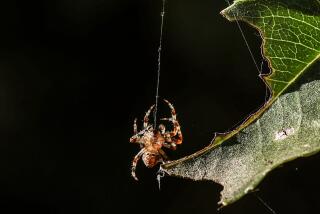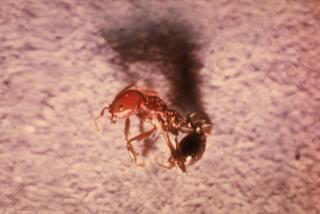Ant colonies: Powerful search engines that benefit from experience
Alone, an ant’s wandering search for food may not seem particularly shrewd. But together, the critters’ foraging strategies are a powerful search engine that could put those Google web crawlers to shame.
The findings, described in the Proceedings of the National Academy of Sciences, show that ants can actually learn from their previous food-finding experiences, and some individuals are actually better at getting results than others.
Plenty of research has been done on ants’ foraging behavior, according to the German-Chinese team that wrote the study, but much of it has been done in unnatural, laboratory settings, without a nest. But foraging colony ants aren’t endless wanderers in real life: They’re constantly circling back to the nest to refuel when they get tired, even if they don’t find food. This return-to-base urge can be an important factor in better understanding ants’ foraging behavior, the scientists point out.
To see what patterns they could find, the researchers combed through already published data on ants’ foraging behavior and tried to identify the mathematical patterns behind it. They found that when a scouting ant first starts searching for food, she makes a random wandering path and, when she gets tired, heads back to base. If she finds food along the way, she heads back home, dropping little scented signals called pheromones on her way to help lead other ants to the buffet.
Here’s the thing: At first, because it’s just one ant trail, the scent is really weak – so other ants may wander off that preliminary trail, dropping scent trails of their own. On top of that, the pheromone evaporates fairly quickly. This could get confusing for the ants that follow, but it ultimately works, and here’s why: The shortest trails will tend to smell the strongest, because the ant will have taken less time to get home and given less time for the pheromone to fade. That’s great, because the strongest-smelling trail will probably be the shortest and easiest trail, and the other ants can make a beeline (so to speak) to the source. So over time, an ordered system emerges out of the ants’ chaotic, random search.
But this system isn’t just based on ants blindly going through the exact same motions over and over. The researchers also found that the middle-aged and older ants were actually much better at foraging than their younger colleagues, so experience clearly plays a role in success. But it still makes sense to have those younger ants go out and feel their way around so that they can get some on-the-job training and gain that necessary experience.
“Our findings provide a new perspective on the behavior patterns of certain animals, and of humans,” the study authors wrote, “which is of importance in areas as diverse as the spread of diseases, the formation of groups (or networks), the patterns of many social activities, and the evolution of short message (or Web) services.”







